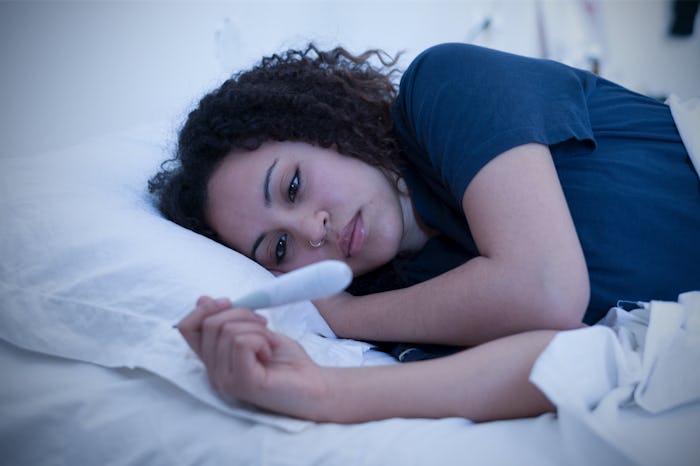Life

Here's How Anxiety Can Impact Your Fertility, According To Science
Trying to conceive isn't always "easy." For some, it's downright stressful. Having little-to-no control over whether of not you become pregnant is, for many women, a difficult thing to navigate. In fact, it can have a major impact on your mental health, sometimes making your anxiety worse. That's why it isn't atypical to wonder if anxiety affects your fertility. The answer, however, just might surprise you.
According to a 2011 study published in BMJ, women who experienced high levels of anxiety before in vitro fertilization (IVF) treatment were just as likely to become pregnant as the women who were less stressed. In other words, experiencing anxiety prior to starting IVF shouldn't impact your results. But what about the women who aren't using IVF to get pregnant? The Anxiety and Depression Association of America (ADAA) reports that anxiety disorders are "the most common mental illness in the United States, affecting 40 million adults in the United States age 18 and older, or 18.1 percent of the population every year." Since anxiety disorders are so common, can they impact a woman trying to get pregnant via sexual intercourse?
According to Dr. Alyssa Dweck, OB-GYN and co-author of V is for Vagina, stress can cause you to miss a period. Dr. Dweck goes on to tell Women's Health it's because "this particular area of the brain, the hypothalamus, is where a lot of the hormones for your period are regulated," and your hypothalamus is impacted by stress. And while it's absolutely possible to get pregnant if you don't have a regular period, Dr. Michele Hakakha, M.D., OB-GYN with a private practice in Beverly Hills, CA, tells Parents that it's more difficult to do so. Basically, when it comes to getting pregnant, stress seems to have at least some affect on the overall process.
According to WomensHealth.Gov, researchers don't know if mental health affects fertility definitively, but they do know that infertility can negatively impact your mental health. Depression, anxiety, or any other mental health disorder could cause an avalanche of side effects that, in turn, make it more difficult to conceive. In other words, it's a vicious cycle, which is why it's important to take care of your mental health when you're trying to conceive, too. An extreme form of stress, for example, might create a change in hormones. And even the "common" side effects of stress — like fatigue, a change in sex drive, and an increase in overall anxiety — can impact how long it takes you to get pregnant.
If anxiety is a concern, there are ways to de-stress. Talking your fears out with loved ones, journaling, consulting a mental health care practitioner, and practicing self-care may help you manage your anxiety. You can get pregnant if you have anxiety, to be sure, but experts say that finding ways to cope with and/or manage your anxiety will help you in the long-run. Another reason to get your anxiety under control? According to the ADAA, 52 percent of women with anxiety report increased anxiety during pregnancy. And because the use of certain medications during pregnancy can pose health risks in some cases, The American Psychiatric Association and the American College of Obstetricians and Gynecologists recommend that if you have a mental health disorder, such as anxiety, and plan to start a family, you should talk to your doctor about possibly tapering off your medication.
The bottom line? Yes, you can get pregnant if you have anxiety, it just might take a little longer than you would have liked.
Check out Romper's new video series, Bearing The Motherload, where disagreeing parents from different sides of an issue sit down with a mediator and talk about how to support (and not judge) each other’s parenting perspectives. New episodes air Mondays on Facebook.